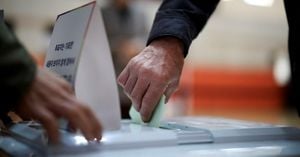Elon Musk's Department of Government Efficiency, or DOGE, is finding itself at the center of multiple controversies as it attempts to reshape federal operations under President Donald Trump. The billionaire tech entrepreneur has been tasked with streamlining government functions and cutting costs, but his methods and public comments have sparked significant debate.
During a recent episode of "The Daily Show," comedian Jon Stewart inadvertently sliced his hand open after smashing a coffee mug on his desk. His outcry came as he criticized Musk's DOGE for ignoring billions of dollars allocated for pharmaceutical subsidies. "The companies we subsidize with billions of dollars are allowing us the privilege to negotiate the price of 10 of their drugs," Stewart exclaimed, expressing frustration at the limited scope of government negotiations on drug prices. The clip underscored what Stewart termed "glaring inefficiencies" within the government, drawing attention to Musk’s controversial management style.
Stewart's rant included stark observations about other wasteful government spending. "How about we just take $3 billion in subsidies we give to oil and gas companies?" he suggested mockingly. He detailed how the government could save enormous sums by ending the carried interest loophole for hedge funds, estimated at $1.3 billion annually, or halting funding for military contractors with questionable results. Stewart's satirical criticism underscored widespread dissatisfaction with DOGE's focus on personnel cuts rather than systemic waste.
Meanwhile, at the 2025 Conservative Political Action Conference (CPAC) held last week, thousands of MAGA Republicans gathered to express support for Musk's initiatives, with attendees telling reporters of their gratitude for DOGE’s financial cuts. One many revealed, "Thank God for Elon Musk!" as they lauded his aggressive measures to reduce the federal workforce, reflecting how Musk has become a symbol of fiscal conservatism among Trump's base.
Yet, the implementation of DOGE's policies hasn't been without issues. Musk recently issued stern threats to federal employees about responding to inquiries on their productivity. Employees were told they would receive another chance to submit their weekly accomplishments after the initial deadline. Failure to do so, Musk warned, could lead to terminations. This ultimatum, aimed at pressuring workers for accountability, soon drew backlash from labor unions and agencies, illustrating the growing tension between traditional government methods and Musk's entrepreneurial approach.
The Office of Personnel Management (OPM) quickly interjected to clarify the limits of Musk's authority, declaring the directive's execution subject to agency heads. They stated, "Many federal employees would be exempt," including those on leave or without email access, putting Musk's ultimatum back under scrutiny. Conjectures arose about the legitimacy of his self-styled role as enforcer.
Despite pushback, Trump stood by Musk’s policies, insisting at a meeting with French President Emmanuel Macron, "I thought it was great because we have people who don’t show up to work..." The president’s endorsement supports the narrative of Musk as someone trying to eliminate fraud and inefficiency from government operations. Yet, this conflicts with growing opposition among established government workers, including steadfast Trump supporters, who see their roles as threatened by DOGE’s initiatives.
The question looms over how sustained Musk's influence will be concerning U.S. policy moving forward, especially with potential foreign relations consequences. His past comments referencing China and his perspective on negotiating with the Chinese have led some to wonder if his business relationships abroad could eventually coerce U.S. policy decisions.
His business stakes, especially his interests related to Tesla's operations, which have seen significant growth and reliance on Chinese markets, create potential conflicts of interest. Musk vocally praised China and its work ethic, contrasting it with American worker critiques, which raises eyebrows among critics concerned about his powerful role within the current administration.
Many speculate whether Musk will leverage his relationships, particularly as he possesses considerable influence over Trump. This raises concerns among political experts, many who argue against deepening relations with Beijing amid current geopolitical tensions. Musk’s affiliations and his financial interests could transmute mere pro-China sentiments to practical policy proposals, putting the administration’s stance toward Beijing under intense scrutiny.
Whether Musk’s ideas will gain traction remains to be seen, but the gravitational shifts he’s creating within the government’s operational framework raise questions about efficiency, loyalty, and effectiveness. His dual roles as both entrepreneur and government advisor blur lines, leaving many to ponder how far his influence extends and what this means for the future of federal governance.



